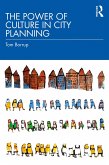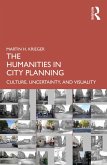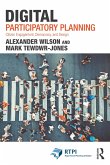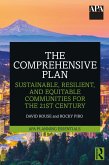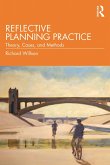Cultural plans as currently conceived are not sufficient to help cities keep pace with dizzying impacts of globalization, immigration, and rapidly changing cultural interests. Cultural planners need to up their game, and enriching their own and city planners' cultural competencies is only one step. Both planning practices have much to learn from one another and already overlap in more ways than most recognize. This book highlights some of the strengths of the lesser-known practice of cultural planning to help forge greater understanding and collaboration between the two practices, empowering city planners with new tools to bring about more equitable communities. This will be an important resource for students, teachers, and practitioners of city and cultural planning, as well as municipal policymakers of all stripes.
Dieser Download kann aus rechtlichen Gründen nur mit Rechnungsadresse in A, B, BG, CY, CZ, D, DK, EW, E, FIN, F, GR, HR, H, IRL, I, LT, L, LR, M, NL, PL, P, R, S, SLO, SK ausgeliefert werden.
-Charles Landry, inventor of the creative city concept, one of leading thinkers on cultural planning, and author of The Creative City and The Art of City Making, among others
"Tom Borrup critiques the Eurocentric and colonialist assumptions often-underlying city and cultural planning, and calls for an anthropological understanding of cities' diverse ways of life. He also addresses city planning's "often-invisible cultural agenda" favoring "dominant economic, political, and institutional cultural interests." Anyone who cares about cities should read this book."
-Thomas Fisher, University of Minnesota
"Borrup's decades of culturally-based community work shine through, providing enriching insights on ways to incorporate culture into city planning. Often overlooked yet critically vital, cultural planning can empower more equitable, socially just and sustainable community development - and The Power of Culture in City Planning is just the book that can help us better understand how to do so."
-Rhonda Phillips, FAICP, Dean and Professor, Purdue University
"Tom Borrup is one of the most authoritative and seasoned voices in creative placemaking today, and The Power of Culture is like having a meaningful conversation on the state of city planning and cultural planning in the western world. This book both inspires and challenges the planner (of cities, arts organizations or cultural environments) to think deeply about their work. It should be part of the reading list for courses on comprehensive community planning and community-based arts planning. City planners and cultural planners should read this book -- preferably together - to see what they've been missing."
-Leonardo Vazquez, AICP/PP, Founding Director, The National Consortium for Creative Placemaking, Director of Creative Placemaking, New England College
"The practice of planning stands to be enriched by a deeper engagement with culture. Yet urban and cultural planning are often a world apart, leading to deficits in equity and social justice. A theorist and practitioner in equal measure, Tom Borrup is the perfect guide to bring these disciplines into fruitful dialogue."
-Andrew Zitcer, Assistant Professor of Urban Strategy, Drexel University



